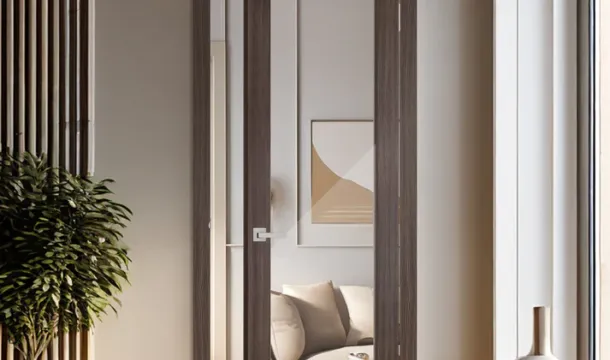How to Choose the Right Hardware for Your Interior Doors: Tips and Tricks
Popular Articles
Interior doors are a vital part of any home, contributing to privacy, design, and functionality. While selecting the right door is crucial, choosing the appropriate hardware is just as important to ensure that the door functions well and complements the overall look of the room. This guide will take you through the different types of hardware used for interior doors, factors to consider, and useful tips and tricks to help you make the best choice.
Types of Interior Door Hardware
1. Handles and Knobs
Door handles and knobs are the most noticeable hardware on any door. They come in various styles, including levers and round knobs, and can be made from a variety of materials such as brass, stainless steel, bronze, or glass.
-
Lever Handles: Lever handles are a popular choice for interior doors because they are easy to use, even for children and elderly people. They also come in a wide range of styles, from traditional to contemporary.
-
Round Knobs: These offer a classic look and are suitable for a more traditional design. They can be slightly harder to turn compared to lever handles, which makes them a better option for rooms where you may want to restrict easy access, such as a home office.
-
Dummy Handles: Dummy handles are non-functional handles used on doors that do not require latching, such as closet or pantry doors.
2. Hinges
Hinges are another critical piece of hardware, as they allow the door to swing open and closed. There are several types of hinges to choose from, each serving a specific purpose:
-
Butt Hinges: These are the most common type of hinge used for interior doors. They are durable and provide smooth operation.
-
Concealed Hinges: Concealed hinges are hidden when the door is closed, giving a clean, seamless appearance. They are ideal for modern interiors where minimalism is key.
-
Pivot Hinges: Pivot hinges are used for doors that open in both directions, providing a unique and functional swing that’s ideal for kitchens or other frequently accessed areas.
3. Locks and Latches
Locks and latches provide privacy and security. Interior door locks come in various forms, each suited to different needs:
-
Passage Latches: These are used for doors that do not need to be locked, such as hallway or closet doors.
-
Privacy Locks: Privacy locks are used on bathroom and bedroom doors to provide a simple locking mechanism without the need for a key.
-
Keyed Locks: Keyed locks are more secure and are generally used for doors that need restricted access, such as a home office.
4. Strike Plates
Strike plates are installed on the door frame and catch the latch when the door is closed. They are essential for ensuring a door latches securely and can withstand repeated use.
-
Standard Strike Plates: These are suitable for most interior doors and provide adequate security.
-
Reinforced Strike Plates: For areas where added security is desired, reinforced strike plates offer increased strength to prevent forced entry.
Factors to Consider When Choosing Door Hardware
1. Functionality
Consider the function of the door when selecting hardware. For instance, a bathroom door requires a privacy lock, while a closet door may only need a dummy handle. The type of room and its purpose will determine which hardware is most appropriate.
2. Design and Style
The hardware you choose should complement the overall design of your home. For a cohesive look, match the finish and style of the hardware with other elements in the room, such as light fixtures or cabinetry.
-
Traditional Homes: Opt for brass or bronze hardware with intricate detailing to enhance the classic appeal of your space.
-
Modern Homes: Choose minimalist designs in chrome or matte black finishes to add a contemporary touch.
3. Material and Finish
The material and finish of the hardware not only impact its appearance but also its durability. Common materials include brass, stainless steel, bronze, and glass.
-
Brass: Brass is a popular choice due to its durability and timeless appeal. It is resistant to rust and corrosion, making it suitable for most interior spaces.
-
Stainless Steel: Stainless steel offers a sleek, modern look and is highly resistant to wear and tear. It is ideal for high-traffic areas.
-
Bronze: Bronze hardware has a unique, aged look that adds character to rustic or traditional interiors.
-
Glass: Glass knobs are elegant and can add a touch of vintage charm, particularly in period homes.
4. Ease of Use
Consider who will be using the door. Lever handles are often easier for children, elderly individuals, or those with mobility issues to operate compared to round knobs. Similarly, certain types of locks may be more user-friendly than others, depending on the occupants.
5. Budget
Door hardware comes in a wide range of prices, depending on the material, design, and brand. It is important to balance cost with quality. Investing in high-quality hardware may cost more upfront, but it will provide better performance and last longer, reducing the need for future replacements.
Tips for Choosing and Installing Door Hardware
1. Match Hardware Throughout the Home
For a cohesive look, use similar hardware throughout the home. This doesn’t necessarily mean that every handle or hinge needs to be identical, but they should share a consistent finish or style to create harmony in your interior design.
2. Consider Door Thickness
Before purchasing hardware, measure the thickness of your interior doors. Most hardware is designed to fit standard door thicknesses, but it's important to confirm compatibility to avoid any issues during installation.
3. Test Before You Buy
If possible, visit a store to test out different handles and knobs before making a decision. Make sure the handle feels comfortable in your hand and operates smoothly. This can help you avoid purchasing hardware that looks good but doesn’t function well.
4. Think About Future Maintenance
Some finishes may require more maintenance than others. For instance, polished brass may need regular cleaning to maintain its shine, while matte finishes may be more forgiving when it comes to fingerprints and smudges.
5. DIY or Professional Installation?
Installing door hardware can be a straightforward DIY project, especially for those with basic home improvement skills. However, if you're dealing with complex locking systems or custom hardware, it might be best to hire a professional to ensure proper installation.
Common Mistakes to Avoid
1. Ignoring the Style of the Door
The hardware you choose should be in harmony with the style of the door. For example, a sleek, modern handle may look out of place on a rustic wooden door. Always consider the overall aesthetic when choosing hardware.
2. Choosing Cheap Materials
While it might be tempting to save money by choosing the least expensive hardware, this can lead to issues down the line. Cheap hardware may wear out quickly, leading to functional problems and the need for frequent replacements. It’s often worth investing a bit more for quality hardware that will stand the test of time.
3. Forgetting About Accessibility
Consider the needs of all household members. Lever handles are generally easier for children, elderly individuals, and those with disabilities to operate compared to round knobs, which require more grip and effort to turn.
4. Not Considering Finish Durability
Some finishes are more durable than others. High-traffic areas may require finishes that are resistant to scratches and wear, such as stainless steel or oil-rubbed bronze. Choosing the right finish will help maintain the appearance of the hardware over time.
Choosing the right hardware for your interior doors is an important aspect of home design that affects both functionality and aesthetics. By considering factors such as functionality, style, material, and ease of use, you can select hardware that meets your needs and enhances the overall look of your home. Remember to match hardware styles throughout your home for a cohesive look, and take the time to test different options to find the best fit for your space.
Whether you are renovating an existing home or building a new one, the right interior door hardware can make a significant difference in the way your home looks and feels. Investing in quality hardware will ensure that your doors operate smoothly, provide the necessary privacy and security, and complement the design of your living spaces for years to come.
Popular Articles

Soundproofing Interior Doors: Which Options Are Best for Your Home?

Choosing the Perfect Interior Doors for Your Canadian Home
